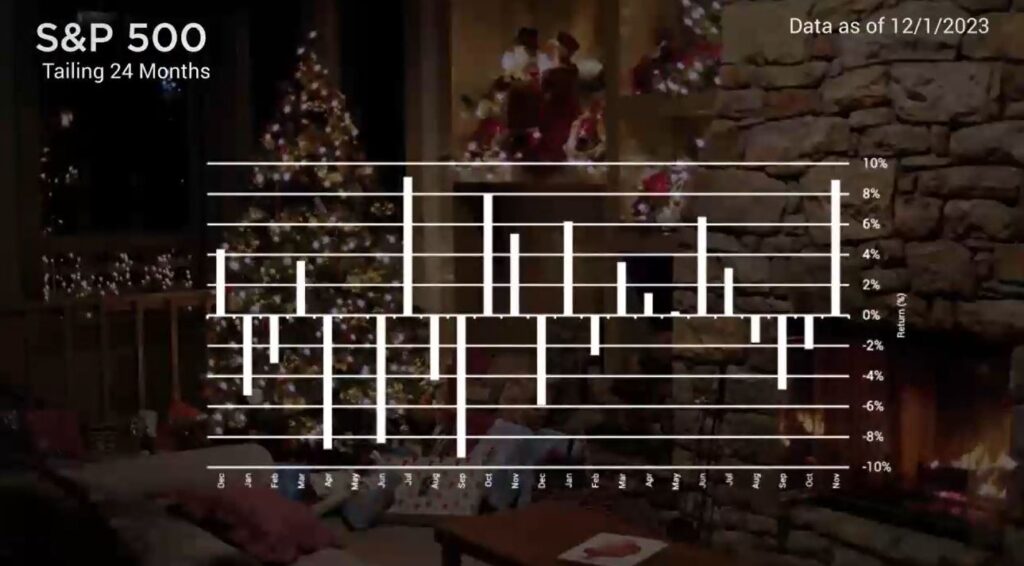Weekly Market Commentary
Major Markets Felt Jolly Last Week
Posted on December 5, 2023
Larson Market Commentary
| The Major Markets felt jolly last week as all five indices closed higher. This marked the fifth consecutive week of gains for the S&P 500. Furthermore, it gave the S&P 500 the best monthly return since July of 2022. Small Cap Stocks fared even better last week as Small Cap Value outpaced the Large Cap Growth side of the style boxes. |

Major Markets |
YTD as of 12/01/2023 | ||
| Nasdaq |  |
||
| Dow Jones Industrial |  |
||
| S&P 500 |  |
||
| MSCI World |  |
||
| MSCI EM |  |
||
| Russell 2000 |  |
||
| Bar US Agg Bnd |  |
||
 |
|||
S&P Sectors |
|
|||||
| Comm. Services |  |
|||||
| Cons. Discretionary |  |
|||||
| Cons. Staples |  |
|||||
| Energy |  |
|||||
| Financials |  |
|||||
| Health Care |  |
|||||
| Industrials |  |
|||||
| Info. Technology |  |
|||||
| Materials |  |
|||||
| Real Estate |  |
|||||
| Utilities |  |
|||||
 |
||||||
| Agent/Broker Dealer Use Only | ||||||
While the gains seemed ubiquitous, Communication Services was notable as being the largest segment that didn’t participate in gains last week.
Meanwhile, the economic calendar was mixed, lending to the idea of a soft landing for the economy following the rate increase cycle. New Home Sales missed expectations Monday with a decrease in the monthly number. However, Tuesday’s Case-Shiller Index came in at expectations with an increase of 3.9 percent.
Consumer Confidence came in with a beat at 102.1, surpassing both expectations as well as the prior reading.
| Wednesday’s initial revision of the Q3 GDP rose from 4.9 to 5.2 percent. Throughout the week, a number of federal reserve members spoke. While the general comments reiterated the idea that it was premature to expect to see rates fall, there were comments from Fed Members Bowman and Waller that offered competing sentiments to the trajectory of interest rates from here. Nevertheless, the Yield curve dropped substantially last week with the two-year duration shedding 36 basis points. This activity favored the bond indices. Due to the drop in interest rates, the Bloomberg Barclays aggregate Bond Index added over two percentage points. https://finance.yahoo.com/news/fed-governors-bowman-waller-clash-on-direction-of-interest-rates-155221195.html?fr=sycsrp_catchall |
Time for a financial checkup?
Click “Schedule a Consult” and get in touch today.
| The S&P 500® Index is a capitalization index of 500 stock-designed to measure performance of the broad domestic economy through changes in the aggregate market value of stock representing all major industries. https://us.spindices.com/indices/equity/sp-500 The Dow Jones Industrial Average® (The Dow®), is a price-weighted measure of 30 U.S. blue-chip companies. The index covers all industries except transportation and utilities. https://us.spindices.com/indices/equity/dow-jones-industrial-average The NASDAQ Composite Index measures all NASDAQ domestic and international based common type stocks listed on The NASDAQ Stock Market. Today the NASDAQ Composite includes over 2,500 companies, more than most other stock market indexes. Because it is so broad-based, the Composite is one of the most widely followed and quoted major market indexes. https://indexes.nasdaqomx.com/Index/Overview/COMP The MSCI World Index, which is part of The Modern Index Strategy, is a broad global equity benchmark that represents large and mid-cap equity performance across 23 developed markets countries. It covers approximately 85% of the free float-adjusted market capitalization in each country and MSCI World benchmark does not offer exposure to emerging markets. The MSCI Emerging Markets (EM) Index is designed to represent the performance of large- and mid-cap securities in 24 Emerging Markets countries of the Americas, Europe, the Middle East, Africa and Asia. As of December 2017, it had more than 830 constituents and covered approximately 85% of the free float-adjusted market capitalization in each country. https://www.msci.com/ The S&P GSCI Crude Oil index provides investors with a reliable and publicly available benchmark for investment performance in the crude oil market. https://us.spindices.com/indices Companies in the S&P 500 Sector Indices are classified based on the Global Industry Classification Standard (GICS®). https://us.spindices.com/indices |






